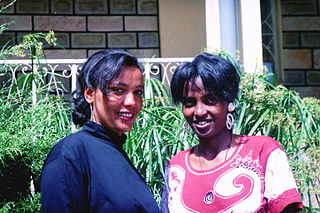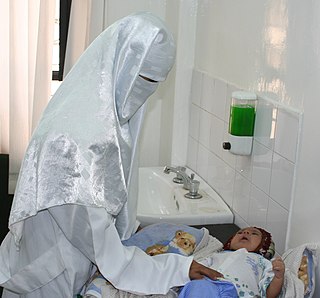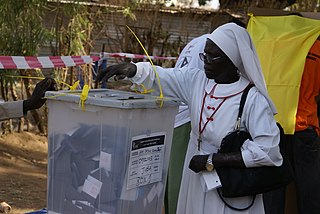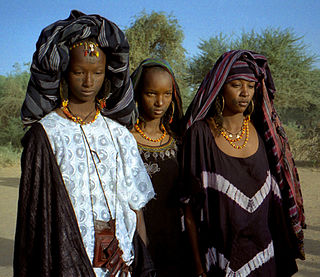Related Research Articles
Marriageable age is the general age, as a legal age or as the minimum age subject to parental, religious or other forms of social approval, at which a person is legitimately allowed for marriage. Age and other prerequisites to marriage vary between jurisdictions, but in the vast majority of jurisdictions, the marriage age as a right is set at the age of majority. Nevertheless, most jurisdictions allow marriage at a younger age with parental or judicial approval, and some also allow adolescents to marry if the female is pregnant. The age of marriage is most commonly 18 years old, but there are variations, some higher and some lower. The marriageable age should not be confused with the age of majority or the age of consent, though they may be the same in many places.

Child marriage is a marriage or similar union, formal or informal, between a child under a certain age – typically 18 years – and an adult or another child. The vast majority of child marriages are between a female child and a male adult, and are rooted in gender inequality.

Lesbian, gay, bisexual, and transgender (LGBT) persons in the Central African Republic face legal and social challenges not experienced by non-LGBT residents. Both male and female same-sex sexual activity is legal in the Central African Republic, but LGBT persons face stigmatization among the broader population.

Forced marriage is a marriage in which one or more of the parties is married without their consent or against their will. A marriage can also become a forced marriage even if both parties enter with full consent if one or both are later forced to stay in the marriage against their will.

There have been several studies concerning women in Ethiopia. Historically, elite women in Ethiopia have been visible as administrators and warriors. This never translated into any benefit to improve the rights of women, but it had meant that women could inherit and own property and act as advisors on important communal matters. As late as the first part of the 20th century, Queen Menen, consort of Emperor Iyasu IV, had a decisive role in running the Ethiopian Empire. Workit and Mestayit regents to their minor sons have been held responsible for their provinces. They owed their rights to landed property because of a special type of land tenure that expected tenants to serve as militia to overlords, irrespective of gender. In 1896, Empress Tayetu Betul, wife of Emperor Menelik II, actively advised the government and participated in defending the country from Italian invasion. Prominent and other landowning women fought against the second invasion in 1935–41. With the assistance of European advisors, women in the ensuing period were kept out of the army and politics, even as advisors. Instead, they were restricted to family and household work of raising children and cooking. With a steady increase in female representation in education, they have started to undertake nursing, teaching, and other similarly supportive roles. Over the 2018–2019 period, their gradual participation in state politics has been increasing at a steady pace.

Issues impacting Women in Mauritanian society include female genital mutilation, child marriage, and polygamy.
Arranged marriage is a type of marital union where the bride and groom are primarily selected by individuals other than the couple themselves, particularly by family members such as the parents. In some cultures a professional matchmaker may be used to find a spouse for a young person.

Women in Yemen have historically been placed at a disadvantage due to their gender, with a highly patriarchal society. Although the government of Yemen has made efforts that will improve the rights of women in Yemen, many cultural and religious norms, along with poor enforcement of this legislation from the Yemeni government, have prevented Yemeni women from having equal rights to men.

Ukuthwala is the South African term for bride kidnapping, the practice of a man abducting a young girl and forcing her into marriage, often with the consent of her parents. These "marriages by capture" occur mainly in rural parts of South Africa, in particular the Eastern Cape and KwaZulu-Natal. The Basotho call it tjhobediso. Among the Xhosa and Zulu people, ukuthwala was once an acceptable way for two young people in love to get married when their families opposed the match. Ukuthwala has been abused, however, "to victimize isolated rural women and enrich male relatives."
International Day of the Girl Child is an international observance day declared by the United Nations; it is also called the Day of Girls and the International Day of the Girl. October 11, 2012, was the first Day of the Girl Child. The observation supports more opportunity for girls and increases awareness of gender inequality faced by girls worldwide based upon their gender. This inequality includes areas such as access to education, nutrition, legal rights, medical care, and protection from discrimination, violence against women and forced child marriage. The celebration of the day also "reflects the successful emergence of girls and young women as a distinct cohort in development policy, programming, campaigning and research."

Women in South Sudan are women who live in and are from South Sudan. Since the Independence of South Sudan on 9 July 2011, these women have gained more power but still face issues of inequality. Many women in this area do not have adequate access to health resources and education. While these women often face inequality, there has been progress since South Sudan's official declaration of independence. In recent years, this inequality has gained national attention and people have become more interested in the issue of child marriage that this area faces. Along with this, there has started to be a focus on the very high level of maternal mortality in South Sudan. With a maternal mortality rate of 789 deaths per 100,000 live births, South Sudan has one of the highest rates in the world.

Women in Niger are women that are from or live in the West African country of Niger. These women belong to a population in which 98% are practitioners of Islam. Laws adopted by the government of Niger to protect the rights of Nigerien women are most often based on Muslim beliefs.

Child marriage is a marriage or union between a child under the age of 18 to another child or to an adult. Child marriage is common in a multitude of African countries. In South Sudan, child marriage is a growing epidemic. Child marriage in South Sudan is driven by socioeconomic factors such as poverty and gender inequality. Current figures state that South Sudan is one of the leading countries in the world when it comes to child marriage. Child marriage has negative consequences for children, including health problems and lower education rates for South Sudanese girls. Many initiatives have been taken to combat child marriage in South Sudan but the presence of societal norms and instability continues to drive its presence in the nation.
Child Marriage in Sudan. In 2017 in Sudan, 34% of girls are married off before the 18 years old. 12% are married before they turn 15. Sudan is the 29th highest nation in the world for child marriage.
Child marriage in the Democratic Republic of the Congo is the eighteenth highest in the world. In a child marriage, one or both parties are under the age of eighteen years old. In the Democratic Republic of the Congo (DRC), 37% of girls are married before they turn eighteen, and 10% of girls are married before age fifteen. Though significantly less than the rate of child marriage for girls, 6% of boys in the DRC are married before age eighteen.
Child Marriage in Mali. In 2017 in Mali, 52% of girls are married off before the 18 yo. 17% are married before they turn 15. Mali is the 5th highest nation in the world for child marriage.
Child marriage is the betrothal of girls and boys below the age of 18.
UNICEF's Early Marriage: A Harmful Traditional Practice report characterizes child marriage as a harmful institution that often exposes young women in developing nations to damaging domestic, health, and sexual conditions. The report also highlights the practice as a human rights violation. In World Vision's "Before She's Ready: 15 Places Girls Marry by 15," the organization highlights the socioeconomic consequences of child marriage on girls, noting that many girls are forced to stop their schooling as a result of their marriages. With the denial of education, girl brides are often not able to make income as adults or become politically active citizens.
In 2017 in Republic of the Congo, 33% of girls are married off before 18 years old. 6% are married before they turn 15. Republic of the Congo is the 30th highest nation in the world for child marriage. Due to the ethnic cleansing that had occurred in the Democratic Republic of Congo, issues regarding poverty and lack of access to basic resources such as food and water grew in intensity. This resulted in parents who were poverty stricken selling their children in exchange for goods according to a report published by United Nations High Commissioner for Refugees
